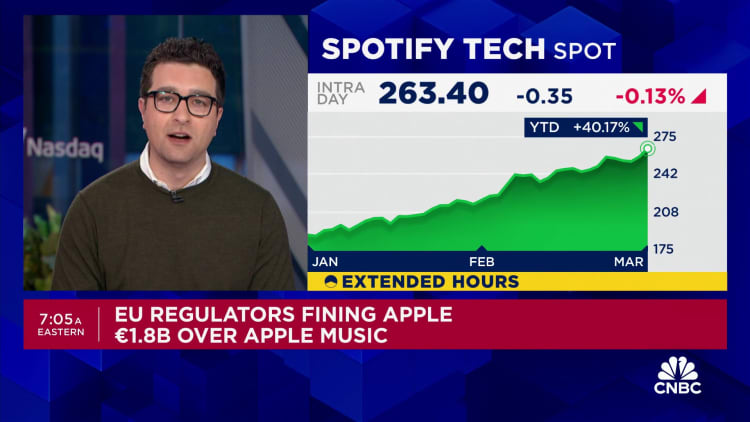
The European Commission, the European Union’s executive arm, on Monday hit Apple with a 1.8 billion euro ($1.95 billion) antitrust fine for abusing its dominant position in the market for the distribution of music streaming apps.
The commission said it found that Apple had applied restrictions on app developers that prevented them from informing iOS users about alternative and cheaper music subscription services available outside of the app.
Apple also banned developers of music streaming apps from providing any instructions about how users could subscribe to these cheaper offers, the commission alleged.
This is Apple’s first antitrust fine from Brussels and is one of the biggest dished out to a technology company by the EU.
Apple shares were down around 2.5% in morning trading in the U.S.
The European Commission opened an investigation into Apple after a complaint from Spotify in 2019. The probe was narrowed down to focus on contractual restrictions that Apple imposed on app developers which prevent them from informing iPhone and iPad users of alternative music subscription services at lower prices outside of the App Store.
Apple’s conduct lasted almost 10 years, according to the commission, and “may have led many iOS users to pay significantly higher prices for music streaming subscriptions because of the high commission fee imposed by Apple on developers and passed on to consumers in the form of higher subscription prices for the same service on the Apple App Store.”
Apple response
In a fiery response to the fine, Apple said Spotify would stand to gain the most from the EU pronouncement.
“The primary advocate for this decision — and the biggest beneficiary — is Spotify, a company based in Stockholm, Sweden. Spotify has the largest music streaming app in the world, and has met with the European Commission more than 65 times during this investigation,” Apple said in a statement.
“Today, Spotify has a 56 percent share of Europe’s music streaming market — more than double their closest competitor’s — and pays Apple nothing for the services that have helped make them one of the most recognisable brands in the world.”
Apple said that a “large part” of Spotify’s success is thanks to the Cupertino, California-based giant’s App Store, “along with all the tools and technology that Spotify uses to build, update, and share their app with Apple users around the world.”
Apple said that Spotify pays it nothing. That’s because instead of selling subscriptions in its iOS app, Spotify sells them via its own website. Apple does not collect a commission on those purchases.
Developers over the years have spoken out against the 30% fee Apple charges on in-app purchases.
Spotify in a statement called the commission’s decision “an important moment in the fight for a more open internet for consumers.”
“Apple’s rules muzzled Spotify and other music streaming services from sharing with our users directly in our app about various benefits—denying us the ability to communicate with them about how to upgrade and the price of subscriptions, promotions, discounts, or numerous other perks,” Spotify said.
“Of course, Apple Music, a competitor to these apps, is not barred from the same behaviour.”
Apple fine just a ‘parking ticket’
The commission said Apple prevented developers of music streaming apps from informing their iOS users within their apps about prices of subscriptions or offers available elsewhere.
App developers could not include links in their apps leading iOS users to the app developers’ websites where alternative subscription could be bought, the commission alleges.
The EU’s executive arm also said Apple prevented app developers from contacting their own newly acquired users — for example via email — to inform them about alternative pricing options.
In a press briefing, EU antitrust chief Margrethe Vestager qualified the basic amount of the fine for Apple, excluding the 1.8 billion euro lump sum, as “quite small” and likened it to a “speeding ticket, or a parking ticket” relative to the company’s scale.
“When Apple imposes these anti-steering provisions on the music provider, they as developers have no other choice than to either accept them or abandon the App store. Apple with its App Store currently holds a monopoly,” Vestager said.
She added the commission has ordered Apple to remove the so-called anti-steering provisions and to “refrain from similar practices in the future.”
EU scrutiny on tech giants rises
The fine will ramp up tensions between Big Tech and Brussels at a time when the EU is increasing scrutiny of these firms.
Last year, the commission designated Apple among other tech firms like Microsoft and Meta as “gatekeepers” under a landmark regulation called the Digital Markets Act, which broadly came into effect last year.
The term gatekeepers refers to massive internet platforms which the EU believes are restricting access to core platform services, such as online search, advertising, and messaging and communications.
The Digital Markets Act aims to clamp down on anti-competitive practices from tech players, and force them to open out some of their services to other competitors. Smaller internet firms and other businesses have complained about being hurt by these companies’ business practices.
These laws have already had an impact on Apple. The company announced plans this year to open up its iPhone and iPad to alternative app stores other than its own. Developers have long complained about the 30% fee Apple charges on in-app purchases.
Vestager fired a warning shot to Apple in regard to the DMA.
“In a couple of days on the 7th of March, Apple will have to comply with the full list of dos and don’ts under the DMA. Among others, Apple can no longer impose rules such as the anti-steering obligations … and this holds for any app on the App Store, not just music streaming apps.”
— CNBC’s Ryan Browne and Ruxandra Iordache contributed to this article.
